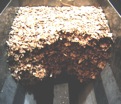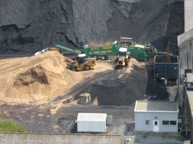
Scale-up of Biomass Conversion Processes
 Considerable efforts are underway to scale up new processes that convert biomass into biofuels, bioproducts, and biopower. Most research process engineers have the training and experience to scale up processes that involve liquid and gaseous streams. Biomass raw materials, however, are typically bulk solids (e.g., wood chips, sawdust, switch grass, and corn stover), and familiar scale-up methods usually cannot be applied. Unfortunately, if scale-up is not performed properly, commercialization will suffer in terms of the time and expense it takes to correct flow problems, time to market, and in many cases, de-rating of the equipment used to receive and store biomass, reduce its particle size, dry the material, or convey the solids.
Considerable efforts are underway to scale up new processes that convert biomass into biofuels, bioproducts, and biopower. Most research process engineers have the training and experience to scale up processes that involve liquid and gaseous streams. Biomass raw materials, however, are typically bulk solids (e.g., wood chips, sawdust, switch grass, and corn stover), and familiar scale-up methods usually cannot be applied. Unfortunately, if scale-up is not performed properly, commercialization will suffer in terms of the time and expense it takes to correct flow problems, time to market, and in many cases, de-rating of the equipment used to receive and store biomass, reduce its particle size, dry the material, or convey the solids.
Retrofitting Systems to Handle Biomass
Twenty-nine states currently have regulations (a renewable portfolio standard) that required a certain portion of their state’s electricity to come from renewable energy sources.
As a consequence, many utilities are modifying their coal-fired boilers to permit the use of biomass fuels such as wood chips, wood pellets, switch grass, and sawdust. Using biomass to produce electricity also allows utilities to sell Renewable Energy Credits (ERCs).
To minimize handling problems and to be able to use existing solids handling equipment, co-firing coal and biomass is often preferable. Unfortunately, adding even a small amount of biomass to coal may cause significant changes in the solids’ flow behavior. The resultant blend may become more cohesive, resulting in flow stoppages in bunkers and silos due to arching. In many cases, the blend may be more frictional and cause the silo to discharge in a funnel flow pattern. In funnel flow, stable ratholes may form, and the silo will not empty completely. In addition, sifting segregation can occur, resulting in an inconsistent feed to the boiler and making its operation difficult to control. Many operations have taken cavalier or low-cost approaches to introducing biofuels into their existing facilities with terrible consequences to their maintenance and operating budgets. Consideration must be given to setting incoming biofuel specifications that ensure no flow problems will be experienced. In addition, the systems must be reviewed based on the flowability of the specified biofuel and strict acceptance/rejection criteria established.
Flowability studies are used to determine what modifications, if any, are required to ensure reliable, unobstructed flow of biofuels and their blends.Visit our Biomass page for more information.






